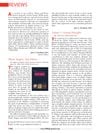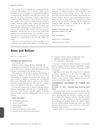 26 citations,
January 2007 in “Organogenesis”
26 citations,
January 2007 in “Organogenesis” Bioengineering can potentially treat hair loss by regenerating hair follicles and cloning hair, but the process is complex and needs more research.
14 citations,
May 2017 in “InTech eBooks” Hair is important for protection, social interaction, and temperature control, and is made of a growth cycle-influenced follicle and a complex shaft.
 13 citations,
October 2004 in “Anais Brasileiros De Dermatologia”
13 citations,
October 2004 in “Anais Brasileiros De Dermatologia” The document concludes that compulsive hair disorders, like trichotillomania, are complex and require careful diagnosis and treatment from both psychiatric and dermatological perspectives.
 12 citations,
September 2017 in “Molecular and Cellular Endocrinology”
12 citations,
September 2017 in “Molecular and Cellular Endocrinology” Testosterone significantly affects sexual desire in both men and women, but its impact on women is more complex and influenced by psychological factors.
 12 citations,
January 1978 in “The Laryngoscope”
12 citations,
January 1978 in “The Laryngoscope” Using a scalp flap for hair transplantation gives denser, faster results than older methods, but it's complex and needs careful planning.
 4 citations,
January 2022 in “Life”
4 citations,
January 2022 in “Life” Tissue engineering could be a future solution for hair loss, but it's currently expensive, complex, and hard to apply in real-world treatments.
 2 citations,
July 2022 in “Frontiers in Medicine”
2 citations,
July 2022 in “Frontiers in Medicine” The cause of Frontal fibrosing alopecia, a type of hair loss, is complex, likely involving immune responses and genetics, but is not fully understood.
 1 citations,
December 2022 in “bioRxiv (Cold Spring Harbor Laboratory)”
1 citations,
December 2022 in “bioRxiv (Cold Spring Harbor Laboratory)” Pangolins have lost some skin-related genes, but kept others, showing complex skin evolution.
 1 citations,
November 2017
1 citations,
November 2017 The document concludes that while some organisms can regenerate body parts, mammals generally cannot, and cancer progression is complex, involving mutations rather than a strict stem cell hierarchy.
 June 2023 in “medRxiv (Cold Spring Harbor Laboratory)”
June 2023 in “medRxiv (Cold Spring Harbor Laboratory)” Nociplastic type pain, common in Chronic Overlapping Pain Conditions, is a complex, heritable trait linked to 24 unique genetic factors and 127 genes, with potential shared mechanisms in cognitive, personality, and metabolic traits.
 August 2014 in “Journal of The American Academy of Dermatology”
August 2014 in “Journal of The American Academy of Dermatology” Obesity is linked to more severe hair loss in adult men and to excess hair growth, but its effects on hair conditions are complex and need more research.
 July 2007 in “Faculty Opinions – Post-Publication Peer Review of the Biomedical Literature”
July 2007 in “Faculty Opinions – Post-Publication Peer Review of the Biomedical Literature” The BASP classification is a detailed system for categorizing hair loss in both men and women, but it may be complex for beginners and not fully suitable for grading female hair loss.
 5 citations,
February 2022 in “International Journal of Molecular Sciences”
5 citations,
February 2022 in “International Journal of Molecular Sciences” Different immune cells like platelets, mast cells, neutrophils, macrophages, T cells, B cells, and innate lymphoid cells all play roles in skin wound healing, but more research is needed due to inconsistent results and the complex nature of the immune response.
 227 citations,
December 2021 in “ACS Nano”
227 citations,
December 2021 in “ACS Nano” Special hydrogels that respond to light can speed up wound healing and prevent infection.
 34 citations,
October 2014 in “European journal of pharmaceutics and biopharmaceutics”
34 citations,
October 2014 in “European journal of pharmaceutics and biopharmaceutics” The new drug delivery system releases the drug better in sebum and targets follicles more effectively than the conventional cream.
 1 citations,
February 2007 in “Plastic and Reconstructive Surgery”
1 citations,
February 2007 in “Plastic and Reconstructive Surgery” The volumes provide comprehensive guidance on aesthetic and reconstructive head and neck surgery.
 September 2016 in “British Journal of Dermatology”
September 2016 in “British Journal of Dermatology” The document discusses new cosmetic dermatology technologies, safety, robotic hair restoration, and upcoming courses on genomics and skin cancer management.
 June 2004 in “Dermatologic Surgery”
June 2004 in “Dermatologic Surgery” The single-scar technique in hair transplantation minimizes scarring and preserves hairs for future use, with proper training overcoming its perceived drawbacks.
 182 citations,
August 2016 in “Development”
182 citations,
August 2016 in “Development” ATP-dependent chromatin-remodeling complexes are crucial for gene regulation, cell differentiation, and organ development in mammals.
 165 citations,
January 2008 in “Journal of biomaterials science. Polymer ed.”
165 citations,
January 2008 in “Journal of biomaterials science. Polymer ed.” The peptide GHK-Cu helps heal and remodel tissue, improves skin and hair health, and has potential for treating age-related inflammatory diseases.
 71 citations,
January 2015 in “Journal of molecular cell biology/Journal of Molecular Cell Biology”
71 citations,
January 2015 in “Journal of molecular cell biology/Journal of Molecular Cell Biology” mTOR signaling helps activate hair stem cells by balancing out the suppression caused by BMP during hair growth.
60 citations,
February 2003 in “Postgraduate Medical Journal” Early diagnosis and haemodialysis can effectively treat thallium poisoning.
 29 citations,
April 2019 in “Acta neuropathologica communications”
29 citations,
April 2019 in “Acta neuropathologica communications” Stopping mitochondrial respiration can prevent brain cancer spread in skin cancer patients, and plant compound β-sitosterol could help achieve this.
 19 citations,
October 1994 in “Tumori Journal”
19 citations,
October 1994 in “Tumori Journal” As of 1994, treatments for liver cancer had not significantly improved patient survival.
 17 citations,
May 2011 in “Gene Therapy”
17 citations,
May 2011 in “Gene Therapy” Using polyethylenimine-DNA to deliver the hTERT gene can stimulate hair growth and may be useful in treating hair loss, but there could be potential cancer risks.
 16 citations,
January 2006 in “The Aging Male”
16 citations,
January 2006 in “The Aging Male” Hormone imbalances can cause skin diseases, and understanding these links is important for diagnosis and treatment.
 5 citations,
September 2017 in “Journal of Cosmetic Dermatology”
5 citations,
September 2017 in “Journal of Cosmetic Dermatology” A marine protein-based dietary supplement can safely boost hair growth and reduce hair loss in people with thinning hair.
5 citations,
June 2012 in “PubMed” Valproic acid can cause a skin condition called leukocytoclastic vasculitis, which usually gets better after stopping the drug.
3 citations,
February 1943 in “The American journal of digestive diseases/American journal of digestive diseases” Riboflavin helps heal bed sores, inositol aids skin diseases, and calcium pantothenate doesn't prevent gray hair.
 2 citations,
January 2022 in “bioRxiv (Cold Spring Harbor Laboratory)”
2 citations,
January 2022 in “bioRxiv (Cold Spring Harbor Laboratory)” A protein called FERONIA helps control root hair growth in response to cold and low nitrogen by activating nutrient-sensing pathways in a plant called Arabidopsis.


























